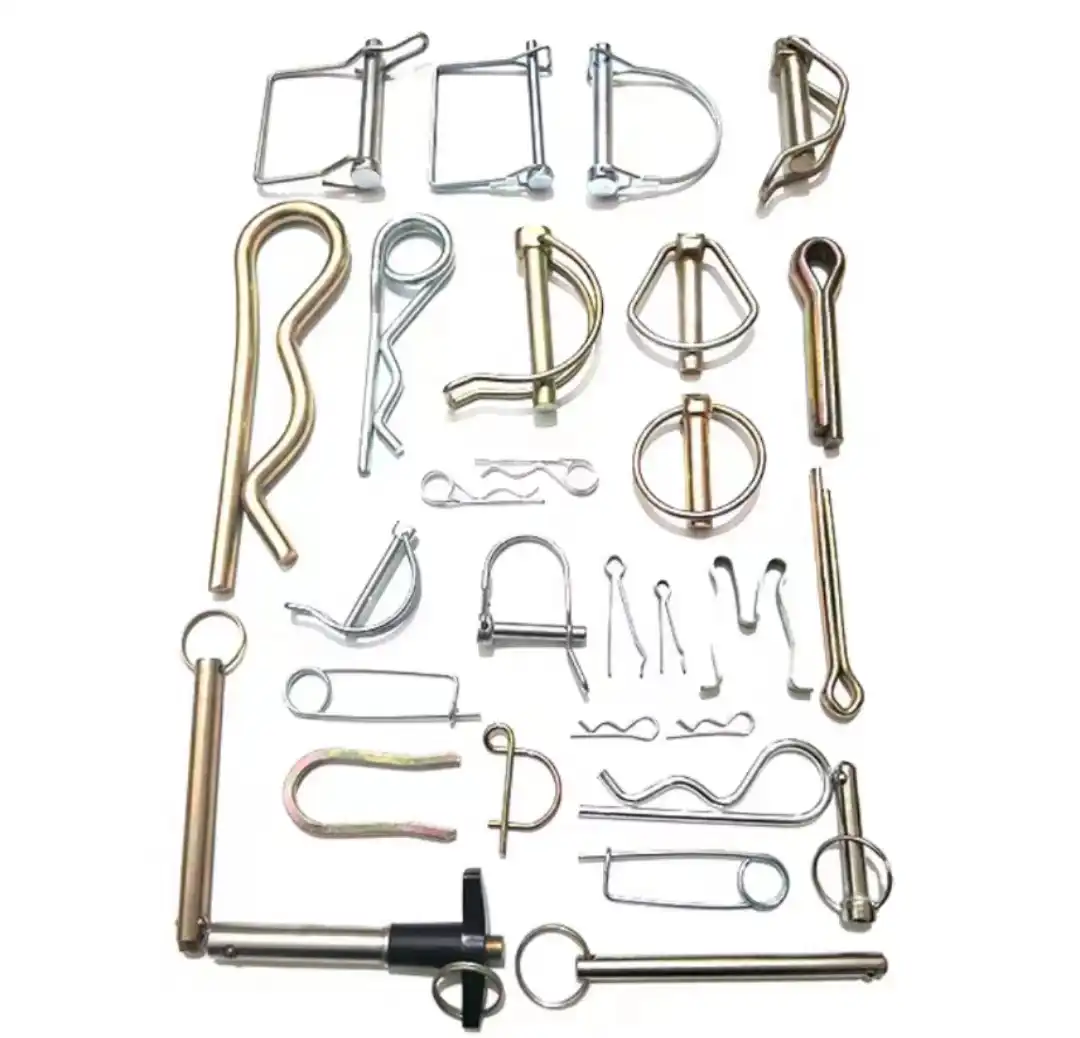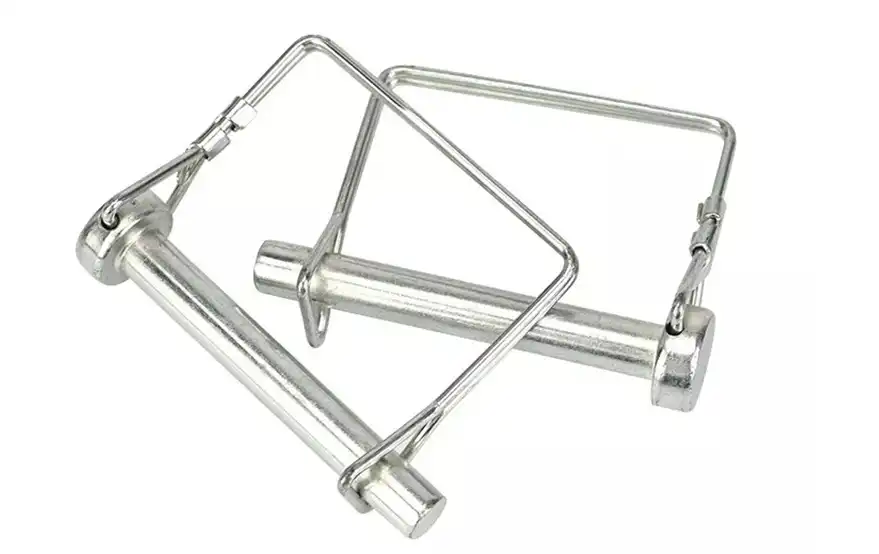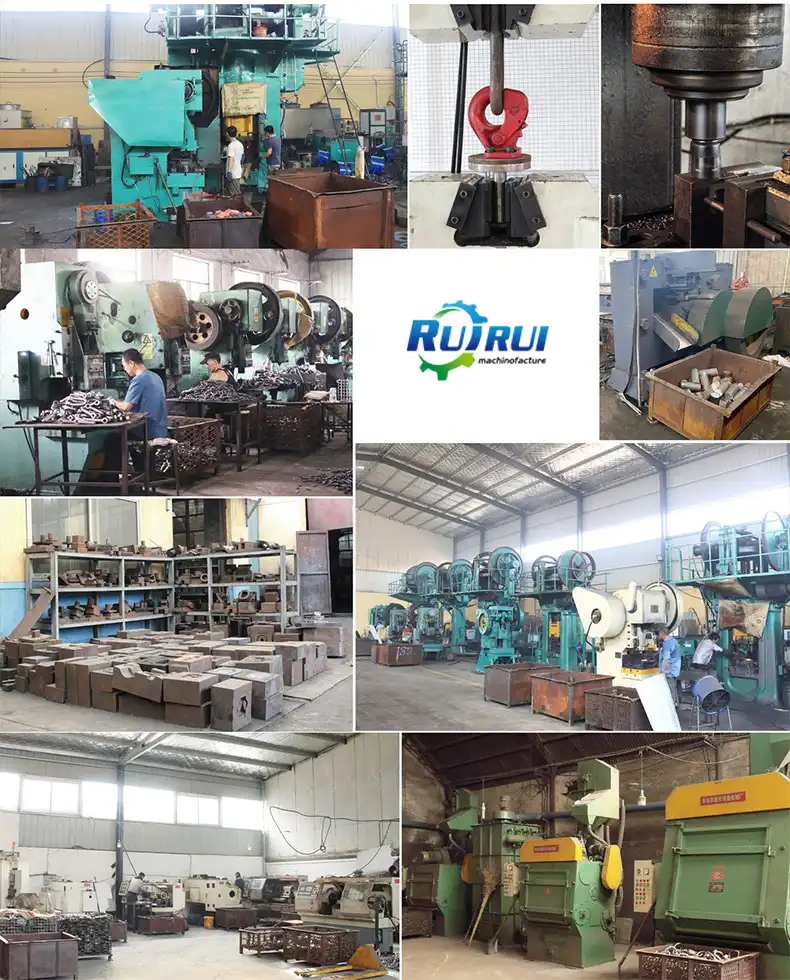How a High-Strength Steel Hitch Pin Improves Your Trailer Safety?
2025-11-06 15:14:44
Picture this scenario: you're driving down the highway at full speed, hauling valuable equipment or your family's camping trailer, when suddenly you hear a metallic clang. Your trailer starts swaying dangerously, and within seconds, it detaches from your vehicle, careening across multiple lanes of traffic. This nightmare becomes reality for thousands of drivers each year, and the culprit is often something as small as a failed hitch pin. A High-Strength Steel Hitch Pin is your frontline defense against catastrophic trailer separation, providing the robust connection that keeps your cargo secured and your loved ones safe during every mile of your journey.

Understanding the Critical Role of Receiver Trailer Hitch Pins in Towing Safety
The connection between your vehicle and trailer relies entirely on a seemingly simple component that often goes overlooked until disaster strikes. When you consider that approximately 50,000 hitch-related accidents occur annually, with over 21,000 resulting in injuries and 450 in fatalities, the importance of selecting the right hitch pin becomes crystal clear. The receiver trailer hitch pin serves as the primary mechanical link in your towing system, bearing immense shear forces and stress loads that standard pins simply cannot withstand under demanding conditions. A High-Strength Steel Hitch Pin transforms this vulnerable connection point into a fortress of security. Manufactured from premium-grade steel alloys and subjected to rigorous heat treatment processes, these pins exhibit tensile strengths exceeding 50,000 pounds in shear force capacity. This exceptional strength ensures that even when hauling heavy construction equipment across rough terrain or towing agricultural machinery through challenging field conditions, your connection remains uncompromised. The molecular structure of high-strength steel provides superior resistance to deformation under load, preventing the gradual bending and weakening that plague inferior pins over time.
-
Material Composition and Engineering Excellence
The metallurgical composition of a High-Strength Steel Hitch Pin distinguishes it from ordinary hardware store alternatives. Advanced manufacturing facilities employ specialized steel grades containing precise ratios of carbon, manganese, chromium, and molybdenum, creating an alloy matrix that delivers unparalleled mechanical properties. Through controlled forging and heat treatment cycles, manufacturers achieve optimal grain structure refinement, resulting in pins that maintain their dimensional integrity even under cyclical loading conditions that would cause standard pins to fatigue and fail. Modern production techniques incorporate computer-controlled quenching and tempering processes that ensure consistent hardness throughout the pin's cross-section. This uniformity prevents the formation of weak spots or stress concentration zones that could initiate crack propagation. Furthermore, precision machining operations guarantee exact dimensional tolerances, eliminating the play and looseness that contribute to wear and premature failure. When you invest in a properly engineered High-Strength Steel Hitch Pin, you're acquiring a component that has undergone extensive quality validation, including destructive testing protocols that verify performance under extreme conditions far exceeding typical towing scenarios.
The Dangerous Consequences of Using Standard Hitch Pins
Every week, eight fatalities occur due to trailer-related accidents, many stemming from inadequate hitch connections. Standard hitch pins manufactured from low-carbon steel or zinc-plated mild steel exhibit insufficient hardness and tensile strength for serious towing applications. When subjected to the dynamic loads generated during highway driving, emergency braking, or uneven road surfaces, these inferior pins experience rapid material degradation. Microscopic surface cracks develop and propagate through the pin's structure, eventually leading to catastrophic failure without warning signs visible to the operator. The economic and human costs of hitch pin failure extend far beyond the immediate accident. When a trailer detaches at highway speeds, it becomes an unguided projectile weighing several tons, capable of causing multi-vehicle pileups and devastating property damage. Insurance claims, legal liability, cargo loss, and potential injury settlements can easily exceed hundreds of thousands of dollars. Beyond financial considerations, the emotional trauma experienced by drivers who witness or cause such accidents leaves lasting psychological scars. Choosing a High-Strength Steel Hitch Pin represents a minimal investment that provides maximum protection against these preventable tragedies.
-
Recognition of Wear Patterns and Replacement Indicators
Professional fleet managers understand that even premium-quality hitch pins require periodic inspection and eventual replacement. The Hitch Pin undergoes continuous stress cycling during normal operations, with each acceleration, deceleration, and road irregularity imposing force vectors that contribute to cumulative fatigue. Visual inspection protocols should include checking for surface rust, corrosion pitting, visible deformation, or any elongation of the pin hole dimensions. If the retention clip or spring-loaded detent mechanism shows signs of looseness or reduced retention force, immediate replacement becomes mandatory to prevent pin migration during operation. Advanced operators maintain detailed service logs documenting hitch pin installation dates and approximate usage hours. High-duty applications such as commercial hauling or construction site operations may necessitate replacement intervals as frequent as every 5,000 miles or six months of service. Recreational users towing lightweight trailers can typically extend replacement cycles, but annual inspection remains essential. The modest cost of a replacement High-Strength Steel Hitch Pin pales in comparison to the consequences of continued operation with a compromised component. Smart operators stock spare pins in their vehicles, ensuring immediate availability when inspection reveals deterioration requiring prompt action.

Advanced Features of Premium High-Strength Steel Hitch Pins
Modern High-Strength Steel Hitch Pin designs incorporate sophisticated engineering features that extend beyond basic material strength. Corrosion-resistant surface treatments such as zinc-nickel alloy plating, powder coating, or advanced ceramic coatings provide exceptional protection against environmental degradation. These protective layers prevent moisture intrusion that could compromise the steel substrate, particularly critical for marine applications or operations in regions where road salt usage is prevalent during winter months. The coating technology employed by leading manufacturers ensures multi-year service life even under harsh exposure conditions. Precision-engineered locking mechanisms represent another critical advancement in hitch pin technology. Spring-loaded ball detent systems provide positive retention that prevents accidental pin removal while facilitating quick installation and removal for operators wearing work gloves. Some premium designs incorporate dual-locking features combining both spring detent and secondary clip retention, creating redundant security that maintains connection integrity even if one locking element fails. The ergonomic design considerations in modern Hitch Pin products reflect decades of user feedback, balancing security requirements with practical usability for daily operations.
-
Compatibility with Diverse Trailer Applications
The versatility of High-Strength Steel Hitch Pins makes them suitable for an extraordinarily diverse range of towing applications. Commercial fleet operators rely on these components for Class III, IV, and V hitch receivers, accommodating vehicles ranging from light-duty pickup trucks to heavy-duty commercial haulers. Construction companies specify high-strength pins for equipment trailers transporting excavators, bulldozers, and other machinery weighing tens of thousands of pounds. Agricultural operations depend on reliable hitch connections for implements and harvest equipment trailers that must withstand constant vibration and shock loads during field operations. Recreational users benefit equally from the security provided by premium hitch pins. RV enthusiasts towing travel trailers or fifth-wheel configurations require absolute confidence in their hitch connections during extended cross-country journeys. Boat owners transporting watercraft to distant lakes or coastal launching facilities cannot afford connection failures that could result in losing expensive vessels on busy highways. Even utility trailer applications for lawn care businesses or home improvement projects demand reliable connections, as trailer detachment incidents cause property damage and legal liability regardless of cargo value. The universal applicability of High-Strength Steel Hitch Pins makes them the prudent choice across all towing scenarios.
Technical Specifications That Define Quality Standards
Professional purchasers evaluate hitch pins based on precise technical specifications that determine real-world performance capabilities. Pin diameter represents the most fundamental specification, with standard sizes including 1/2-inch and 5/8-inch dimensions corresponding to receiver tube pin hole sizes. The 5/8-inch diameter configuration provides significantly greater shear strength capacity, typically rated for weight capacities up to 21,000 to 30,000 pounds depending on material grade and heat treatment. Length specifications typically range from 3 inches to 5 inches, ensuring compatibility with various receiver tube depths and allowing adequate engagement length for maximum strength utilization. Shear strength ratings provide the most critical performance metric for Receiver Trailer Hitch Pin selection. Reputable manufacturers conduct certified testing procedures following ASTM standards, subjecting sample pins to controlled loading until failure occurs. High-quality pins exhibit minimum shear strengths exceeding 50,000 pounds, providing substantial safety margins beyond typical towing load requirements. The testing documentation should specify whether ratings represent ultimate failure loads or working load limits incorporating appropriate safety factors. Professional operators always select pins with ratings substantially exceeding their maximum anticipated towing weights, accounting for dynamic load multiplication factors that can double static loads during emergency braking or rough road conditions.
-
Certification Standards and Quality Validation
Manufacturers serving professional markets obtain multiple quality certifications demonstrating compliance with international standards. ISO 9001 certification verifies that production facilities maintain comprehensive quality management systems ensuring consistent product specifications across all manufacturing batches. ISO 14001 environmental certification indicates responsible manufacturing practices minimizing ecological impact. For high-strength steel products, material certifications traceable to steel mill source documentation provide assurance regarding alloy composition and mechanical property verification through independent laboratory testing. Qingdao Ruirui Machinery exemplifies this commitment to quality excellence through their comprehensive certification portfolio including ISO 9001, ISO 14001, ISO 20000, and OHSAS 18001 credentials. Their engineering team maintains detailed quality files documenting the complete manufacturing process for each production batch, from raw material inspection through final dimensional verification and load testing. This meticulous quality control approach ensures that every High-Strength Steel Hitch Pin leaving their facility meets or exceeds published specifications, providing customers with confidence in component reliability for critical towing applications where failure consequences are unacceptable.
Maintenance Best Practices for Extended Service Life
Proper maintenance protocols significantly extend hitch pin service life while maintaining optimal safety performance. Before each towing operation, operators should conduct visual inspections verifying that the pin exhibits no visible damage, corrosion, or deformation. The locking mechanism should engage positively with audible confirmation, and the retention clip or spring detent should hold firmly without excessive play. Any accumulation of mud, dirt, or debris around the pin or receiver tube requires thorough cleaning using wire brushes and appropriate solvents, as contamination can accelerate wear and compromise locking mechanism function. Lubrication represents a critical but often neglected maintenance requirement for Hitch Pin components. Applying thin coats of anti-seize compound or marine-grade lubricant to the pin shaft before insertion reduces friction, prevents galling between dissimilar metals, and facilitates easier removal after extended periods of installation. The lubricant also provides additional corrosion protection, particularly important for users operating in coastal environments or regions with aggressive winter road treatment programs. However, operators must avoid over-lubrication, as excessive grease can attract and retain abrasive particles that accelerate wear rather than preventing it.

Conclusion
A High-Strength Steel Hitch Pin represents your most critical investment in towing safety, transforming a potential failure point into an engineered connection capable of withstanding extreme forces. Through superior metallurgy, precision manufacturing, and advanced protective coatings, these essential components deliver the reliability that protects your valuable cargo, prevents catastrophic accidents, and provides peace of mind during every towing operation across diverse applications and challenging conditions.
Cooperate with Qingdao RUIRUI Machinary Co., LTD.
As a leading China High-Strength Steel Hitch Pin manufacturer and China High-Strength Steel Hitch Pin supplier, Qingdao RUIRUI Machinary Co., LTD brings over 15 years of manufacturing excellence to the global trailer accessories market. Our state-of-the-art facility in Qingdao features eight fully automated production lines producing 130,000 precision-engineered components annually, supported by advanced CNC machining, laser cutting, and thermoplastic coating capabilities. We specialize in custom metal fabrication across diverse materials including high-grade steel, stainless steel, aluminum alloys, and brass, ensuring optimal material selection for your specific application requirements.
Our China High-Strength Steel Hitch Pin factory maintains comprehensive quality certifications including ISO 9001, ISO 14001, ISO 20000, and OHSAS 18001, guaranteeing consistent product excellence through rigorous quality control protocols. Whether you require standard receiver trailer hitch pins or custom-engineered solutions for specialized applications, our experienced R&D team collaborates closely with your engineering staff to develop products precisely matching your specifications. We offer competitive China High-Strength Steel Hitch Pin wholesale pricing for bulk orders, short delivery timeframes enabled by efficient production scheduling, and professional OEM support for branded product development.
Experience the superior quality of High Quality High-Strength Steel Hitch Pin products manufactured to exacting standards. Our High-Strength Steel Hitch Pin for sale inventory includes multiple diameter and length configurations, with competitive High-Strength Steel Hitch Pin price structures for volume purchasers. Contact our technical team at info@qdkshd.com today to discuss your specific requirements, request detailed product specifications, or arrange facility tours to witness our advanced manufacturing capabilities firsthand. Bookmark this resource for future reference when planning your procurement strategy, and reach out whenever questions arise about optimizing your trailer safety equipment selections.
References
1. National Highway Traffic Safety Administration. "Trailer Hitch Safety Standards and Accident Statistics." NHTSA Technical Report Series. Washington, DC: U.S. Department of Transportation.
2. American Society for Testing and Materials. "ASTM F1378 Standard Specification for Hitch Pins." ASTM International Standards. West Conshohocken, PA: ASTM International.
3. Society of Automotive Engineers. "SAE J684: Trailer Couplings and Hitches - Automotive Type." SAE Technical Paper Series. Warrendale, PA: SAE International.
4. Trailer Engineering Association. "Best Practices for Trailer Hitch Component Selection and Maintenance." TEA Industry Guidelines. Arlington, VA: Trailer Engineering Association.
Send Inquiry
You may like
